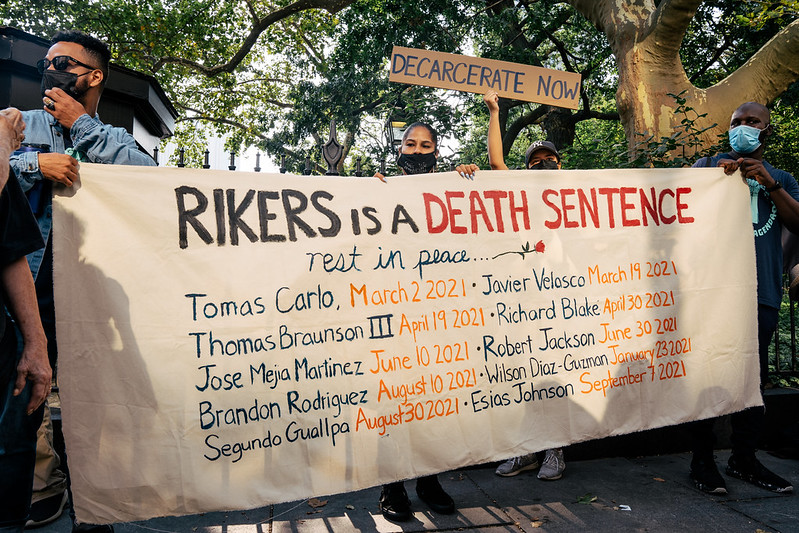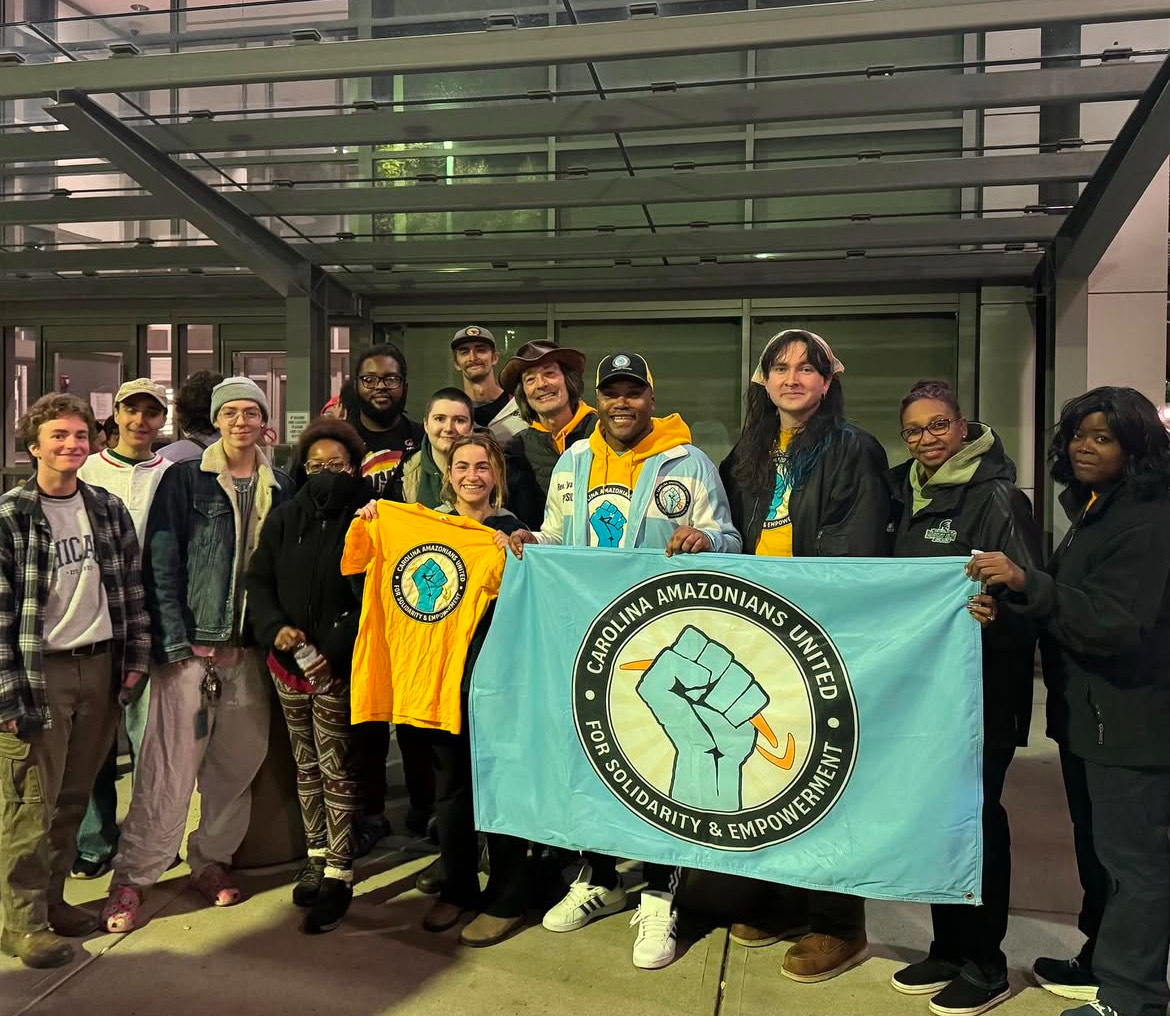Dozens of protestors gathered at the gates of City Hall with banners and signs this morning to demand that Mayor Bill de Blasio end all forms of solitary confinement on Rikers Island.
“People are isolated, sleeping in their own feces and urine, and dying,” said Melania Brown, 33 of Brooklyn. Her sister, Layleen Polanco, died in solitary confinement at Rikers in 2019.
Ten people have died on Rikers Island in solitary confinement this year. Protesters held up a banner with the names of those who died, five were labeled as suicide. The most recent death was Esias Johnson, who died the day before his court date on September 7. His cause of death is listed as unknown.
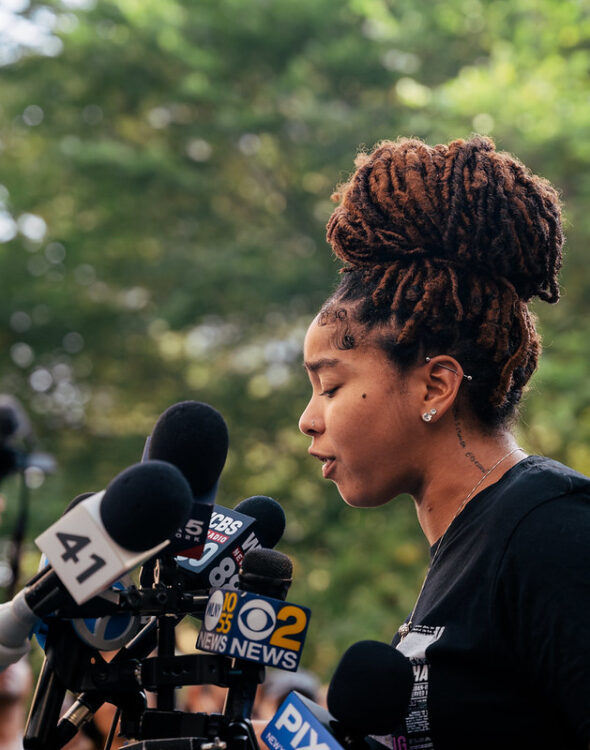
Melania Brown, 33 of Brooklyn, sister of the late Layleen Polanco who died in solitary confinement on Rikers Island, speaks to fellow protesters on why solitary confinement should end. September 15, 2021. Photo by Nathan Morris
When an inmate is placed in solitary confinement, they are left alone in a cell. There is only limited contact with a guard who brings them food and water. There are no phone calls, visits, or anything to read. Most of the inmates at Rikers have not been convicted of a crime and about 40 percent have been diagnosed with a mental illness. In 2020, about 13 percent of the 7,200 people held at Rikers were placed in solitary confinement and inmates are typically placed there because of disciplinary issues.
Brown has been advocating for her sister who died on Rikers Island on June 7, 2019 from an epileptic seizure while in solitary confinement. She said her sister was not consistently given medication for her seizures. Her family was awarded a $5.9 million settlement from a wrongful death lawsuit.
“In the security footage outside of her cell, they watched her die and did nothing during that time,” Brown said. “Instead of calling for help immediately, they stood at her door, watched, and one of the guard’s even laughed.”
Seventeen officers were disciplined in her death.
After her death, de Blasio promised to end solitary confinement. The name was changed to Risk Management Accountability System and offers a more “humane alternative” to solitary for the safety of both inmates and staff. The change is scheduled to begin in fall 2021. But meanwhile staff shortages has led to Rikers becoming more violent and suicides drastically increasing. Lawmakers are calling current conditions at the jail a “humanitarian crisis.”
But as Rikers falls into further disarray, protesters want to make sure inmates are not subjected to the even more harsh conditions of solitary confinement.
“People are still dying within the walls of Rikers Island,” Brown said.
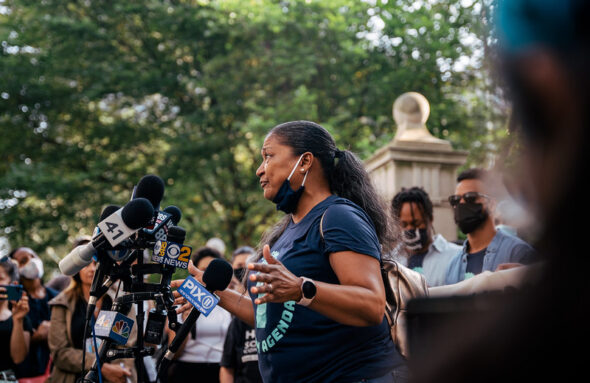
Peggy Herrera, 51 of Queens, shares her story as a mother of a son who suffers from mental health and was in solitary confinement. September 15, 2021. Photo by Nathan Morris
Peggy Herrera, 51 of Queens spoke on behalf of her 23 year old son at the rally, who spent time in solitary confinement at Vernon C. Bain Correctional Center, also known as The Boat, which took in numerous inmates from Rikers Island because of capacity issues.
“My son was on The Boat for three nights,” she said. “Not only was he alone in a dirty cell, he was given no food or even a bed to sleep on. He was left to sleep on the floor and had roaches climbing on him.”
He also has a history of suffering from mental health.
“Jails are not mental health centers. If you want to help them, you get them treatment, jobs, and education,” Herrera said.
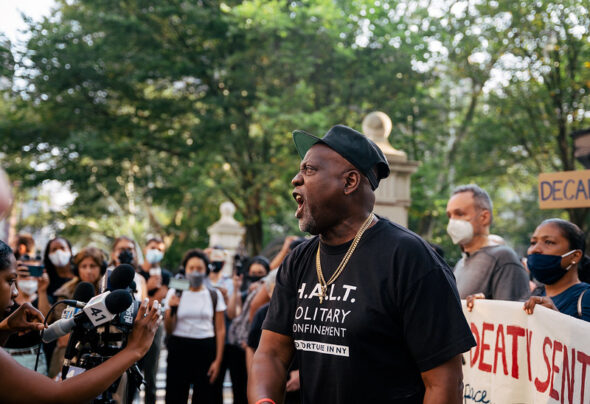
Jerome Wright, 61 of Buffalo, N.Y., speaks to protesters about his experience as a survivor of solitary confinement and his fight to end it. September 15, 2021. Photo by Nathan Morris
Jerome Wright, 61 of Buffalo, N.Y., spent a year and a half on Rikers Island and 29 years in upstate prison. Of that time, seven years were in solitary confinement. That’s 2,555 days of sitting in inhumane and trauma-inducing conditions.
“We are taking people and throwing them away while knowing that they have to come back to society,” Wright said. “We never blame the system that put them there. Education, therapy, or any type of real human contact do not exist for these people and they should.”
Following the rally, Brown said she was heading home to give her testimony in the virtual city council hearing on the conditions at Rikers Island.
“There is human suffering there. The people inside don’t have a voice. We need to be their voice,” Brown said.
